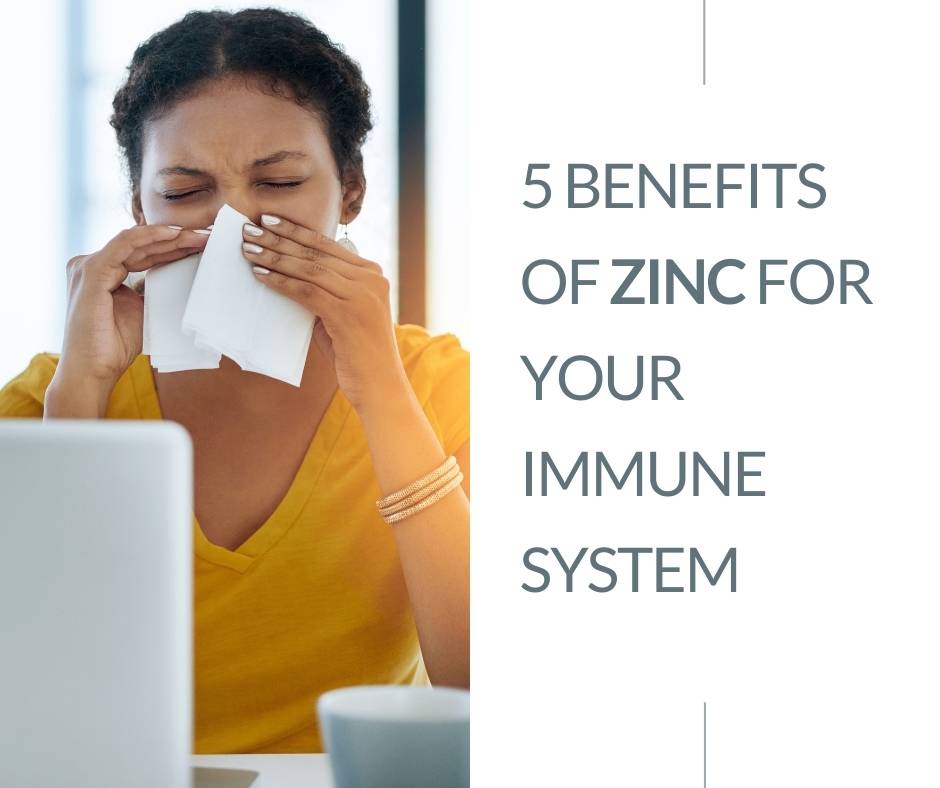5 benefits of Zinc for your immune systemA healthy immune system helps to defend the body against illness and infections. And you need to keep it in the best shape to maximize its protective power. How? You can try to get a good night’s sleep. Exercise on a regular basis. Eat healthy foods, including a varied mix of fruit, vegetables, and proteins. But there’s another key ingredient in the recipe for a strong immune system: zinc. Why is it so important? Here are five good reasons … Zinc can aid in the production of immune cellsZinc stimulates the growth of T helper cells. These are white blood cells with a crucial job: they target unwanted organisms entering the body — and fight them. Another type of immune cell is the macrophage. These are responsible for consuming and digesting anything that isn’t recognized as a healthy host cell, including:
This process (phagocytosis) helps you ward off viruses and diseases. And zinc can help them to complete the phagocytosis process and defend your system from bacteria. Anyone with a zinc deficiency may develop an impaired immune system, due to the reduction in macrophage function. The number of T helper cells would likely drop too. Zinc can reduce the risk of pneumoniaPneumonia is a dangerous disease affecting the lungs, capable of causing serious illness — and even death. From 2018 - 19, around 67,000 Canadians were hospitalized due to the condition, accounting for more than 2 percent of all inpatient hospitalizations at the time. But how could zinc help your immune system fend off pneumonia successfully? One of the microbes the immune system should target is Streptococcus pneumoniae — a form of bacteria responsible for causing pneumonia. Zinc can barricade the route this bacteria uses to consume nutrients. This denies the bacteria the sustenance it needs to persist, and starves them. A healthy immune system will then take over, unleashing immune cells to finish the pneumonia off. It’s not a miracle cure, sadly, but some patients may be safer from pneumonia if they elevate their zinc levels into a more normal range. Zinc can shorten the duration of common cold symptomsThe common cold is, well, common — adults have two or three colds each year on average, but children tend to have even more. We all recognize the signs: sore throat, coughing, runny nose, aches here and there. In some cases, a cold will become more serious and cause complications, such as ear infections. And while there’s still no cure, a strong immune system can help to reduce the amount of time that you actually spend suffering from the effects of a cold. Research shows that people who increase their zinc levels to a higher but safe level within 24 hours of noticing their first symptoms were far less likely to have symptoms one week later. Why? It’s simple: zinc may help to stop the virus replicating and spreading. Being able to reduce the duration of your cold could decrease the amount of time that you need to take away from work or other responsibilities. Zinc can fight inflammationUpping your zinc to a normal, healthier level could strengthen your body’s ability to combat problematic inflammation. Not all inflammation is negative: short-term inflammation actually helps to defend the body. But chronic inflammation can cause lasting pain and conditions, including:
But studies reveal that zinc can decrease inflammation, particularly in older people, as well as oxidative stress (a cause of inflammation). Those with a zinc deficiency are at higher risk of developing arthritis, and zinc was found to reduce infection rates by more than 65 percent. Zinc can maintain membrane barrier structureAnd last but not least? Let’s talk about membrane barrier structure. Zinc can help to maintain membrane structure and restore it, particularly in areas that may be vulnerable (e.g. the intestine and lungs). As a result, zinc can contribute to your body’s defensive capabilities. It can also stabilize cell membranes and help your skin heal: a zinc deficiency may affect the body’s ability to heal wounds, especially in elderly people. What are the easiest ways to get zinc into your body?Certain people are at risk of zinc deficiency — pregnant women, anyone with gastrointestinal problems, even vegetarians. But you can increase your zinc intake (and help your immune system stay strong) in multiple ways. Eating the right foodsOne of the simplest options for getting more zinc? Food. Certain ones are rich in zinc, including:
You can include most of these in a wide range of delicious meals, or devour them as snacks. Try sprinkling pumpkin seeds and a little dark chocolate on your oatmeal for irresistible crunch (not to mention yummy chocolatey flavor). SupplementsAnother easy method for upping your zinc to a healthier level is the humble zinc supplement. But discuss this with your doctor first: they’ll let you know whether zinc supplements are safe for you or not. Immune system treatmentsSpecific treatments are designed to boost your immune system. These include IV therapies, in which solutions are injected directly into the body: nutrients go straight into the bloodstream and bypass the digestive process, unlike foods and oral supplements. One is the IV Glutathione treatment. This contains a powerful antioxidant, glutathione, that can help to:
This solution is formulated carefully to leave you looking and feeling fantastic. The IV Immune Boost is another popular option. This contains glutathione and vitamin C, which is known for aiding the immune system by supporting numerous cellular functions. Improving your immune system is vital to stay healthy and strong at any age. Follow these tips to up your zinc levels and boost your immune system, whether you choose to adjust your diet, try IV therapies, or both. Astra Medicare’s IV Glutathione and IV Immune Boost treatments are available now. Want to book a consultation to learn more? Contact our team today!
0 Comments
7 Benefits of Vitamins C & D to Boost Your Immune System to Fight COVID-19The world is waiting for a COVID-19 vaccine. But while teams are hard at work trying to find one, all we can do is stay indoors and try to avoid contracting the virus as best we can. A key part of this is eating right to keep your immune system strong and healthy. Getting a good mix of fruit and vegetables might not be as easy as it used to be, but a huge variety of foods can give you helpful nutrients. Vitamin C and D are two of the most important, but why? And how can you get more of them into your body? What Foods Contain Vitamin C and D?Experts recommend the average adult should try to get 65 to 90 milligrams of vitamin C and 10 - 20 micrograms of vitamin D per day. You can find vitamin C in:
These foods either make great snacks or fantastic additions to delicious meals, such as pastas, curries, fruit salads, and more. Generally, the more colors you have on your plate, the better. And what about vitamin D? You can find that in:
Another major source of vitamin D is sunlight. With so many of us in self-isolation and afraid to go outside right now, getting some nourishing UV rays on your skin might seem hard. But you don’t need to bask in the sun for hours for a good dose of vitamin D: as little as 15 minutes might be enough, depending on your skin color. 7 Benefits of Vitamin C and DHere are 7 benefits of vitamin C and D in boosting your immune system and keeping your body healthy: 1. Help create white blood cellsOne of the biggest benefits of vitamin C is its overall ability to boost your immune system. It does this by stimulating production of white blood cells (known as lymphocytes and phagocytes), which can help to protect against infection. Lymphocytes are powerful antibodies created as a response to pathogens (bacteria with the potential to cause disease) or antigens (harmful toxins). Phagocytes identify pathogens and other dangers within the body, and surround them. They digest and neutralize the threats to remove them safely. Vitamin C also helps these cells do their job better while working to protect them from free radicals and other molecules with the potential to cause harm. 2. Turn on the immune system’s key peptidesVitamin D can help you reduce your danger of contracting infectious diseases by switching on important peptides (a compound of two or more amino acids) within the immune system. This starts a response that works to keep potential invaders away before they lead to a potentially-harmful infection. 3. Reinforce the body’s natural defensesAnother key benefit of vitamin C is that it can make your body’s own natural defenses stronger. As an antioxidant, vitamin C protects cells from free radicals and can fight off chronic diseases (such as heart disease), and can boost the antioxidant levels in your blood significantly. 4. Prevent your immune system from attacking itselfThe immune system can become so highly-stressed and confused that it starts to attack the body’s own tissue instead of threats like viruses and bacteria. Autoimmune diseases can affect almost any part of the body, and common versions include inflammatory bowel disease, psoriasis, lupus, and multiple sclerosis. Fortunately, vitamin D helps to reduce the risk of autoimmune diseases by encouraging the production of T cells, which differentiate between unwelcome and welcome cells. A good amount of vitamin D basically works to create a more effective, smarter immune system that’s less likely to start attacking itself and focus on fighting harmful invaders instead. 5. Improve healing timeHealing times may be improved by both vitamin C and vitamin D. Vitamin C is an ascorbic acid, which helps the body produce collagen and ensure it’s as strong as it has to be. Vitamin D stimulates the formation of a peptide known as cathelicidin, which helps the immune system fend off potential wound infections. 6. Reduce the risk of respiratory infectionsOne of the biggest risks COVID-19 poses is respiratory issues. Some people might develop an uncomfortable dry cough, while others could end up affected by a far more serious problem — pneumonia. This happens when the COVID-19 infection reaches the air passages running to the lungs. Inflammation starts to strike, the nerves in the airway are irritated, and air sacs within the lungs start to produce inflammatory substances. Pneumonia can be fatal, particularly for those with existing respiratory conditions. Vitamin D has been shown to help protect people against respiratory infections, and vitamin D deficiency has been linked to the development of pneumonia, particularly in children. 7. Combat iron deficiencyFinally, let’s talk about iron. Iron is a vital nutrient which helps the body to create red blood cells and transport oxygen. Being deficient in iron can lead to anemia and leave your immune system weaker than it should be. Vitamin C is essential for converting iron into a form that’s absorbed more easily. This is especially important if you’re on a plant-based diet, as meat tends to be richer in iron. Studies show that vitamin C can help to prevent iron deficiency and control related anemia, potentially strengthening the immune system. Getting the recommended amount of vitamin C and vitamin D in your diet can help your immune system work as it should, which is more important than ever as COVID-19 continues to claim lives worldwide. We all have to look after our health by eating the right foods, though you can still give your body the essential nutrients it needs in another way. IV therapy is a quick, simple option, particularly the IV Immune Boost treatment. This is formulated with vitamin C and Glutathione, an antioxidant capable of preventing cell damage. To learn more about IV therapy, speak to a member of our expert team today. |
AuthorDedicated and passionate Astra Medicare staff. Archives
June 2024
Categories
All
|



 RSS Feed
RSS Feed